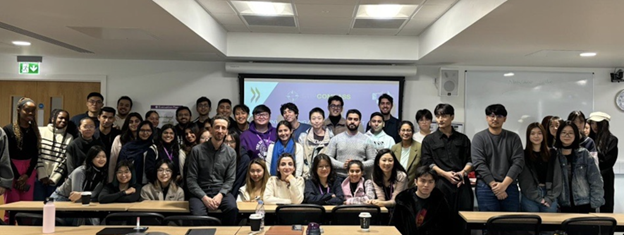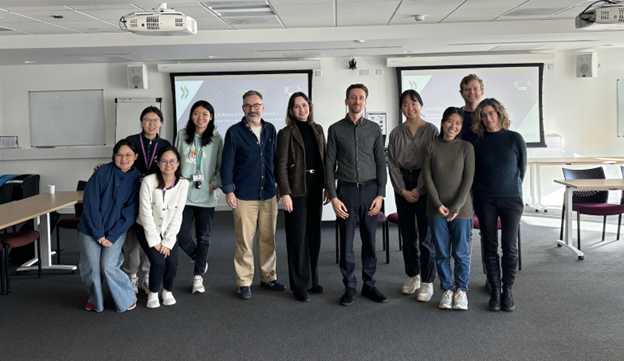Introducing the STIP Compass Dataset: Exploring research potentials from STI policy data
We recently had the pleasure of welcoming David Howoldt, Science & Innovation Policy Analyst at the OECD Directorate for Science, Technology and Innovation (STI). Prior to joining the OECD, David worked at the Fraunhofer Institute for Systems and Innovation Research in Germany and in management consulting. He holds a PhD in Innovation Studies from the Copenhagen Business School, with a focus on the intersection of innovation policy and organisational strategy. During his visit, David provided a comprehensive overview of STIPCompass, with insights into how policymakers use the dataset and the types of research questions it can effectively answer. His visit was also a great opportunity to gain an understanding of the OECD’s research agenda and career opportunities at the OECD.
STIP Compass Master Class

His visit started with the STIP Compass Masterclass, which was open to PhDs in Science, Technology and Innovation Policy and MSc students in Innovation Management and Entrepreneurship (IME). The masterclass covered an overview of the STIP Compass project, the STIP dataset, potential research questions that can be answered with the dataset and future perspectives.
Since 2016, the STIP Compass project has been collecting qualitative and quantitative data on national trends in STI policies. This supports the monitoring and review of STI policies, making a fundamental contribution to the growing evidence base on STI policies and enabling better policy-making to efficiently achieve STI policy goals of societal interest. STIP Compass includes around 8,000 active policy initiatives and 10,000 instruments, mainly collected through four survey waves since 2017.
The primary data source for the STIP Compass is the STIP Survey, a country-level expert survey on STI policies jointly conducted by the European Commission (EC) and the OECD, covering around 60 countries. It provides a comprehensive overview of the STI policies implemented in the participating countries, covering key topics such as the public research system, innovation in enterprises, entrepreneurship and STI policies to achieve net-zero. Policy initiatives are the main unit of observation and are characterised by taxonomies for policy instruments, target groups, policy themes and a list of budget ranges.
It contains data produced specifically for STI and could be useful mainly for exploratory research. Although there are differences in data quality at the country level, this would be helpful for policy design or for building generalisable country characteristics (e.g. publication or patent statistics). Potentially, this dataset could also answer questions about how policymakers learn from each other, how policies diffuse, or how the language of STI policy varies or evolves. The OECD also plans to implement LLMs throughout the survey and data cycle to streamline the dataset by helping respondents to provide more structured survey responses and users to obtain information tailored to their needs.
The masterclass sparked fruitful discussions and insights among students. One student remarked, “It’s heartening that international organisations like the OECD engage with master’s students and respect their opinions; it makes me feel that the work I do could have a bigger impact than I thought.”
Another noted, “It’s encouraging to see how closely the STIP Compass engages with people involved in national policy. Hopefully, this will allow policymakers to incorporate feedback from a wider range of stakeholders to design even better policies. And it looks like the STIP Compass can really support that.”
ECR Panel Session

We continued the conversation at a panel for early career researchers (ECRs), where we welcomed several PhD students, postdocs and lecturers. We asked David to talk about the history of the STIP Compass project and the potentials and limitations of the dataset. He mentioned, for example, that while the dataset offers many advantages for research, such as more than 700 interactive dashboards and sophisticated search tools, researchers should be aware that the data consist of self-reported descriptions of STI policy initiatives, mostly at the national level.
The panel also provided an opportunity for ECRs to learn more about David’s personal career path, including his experience of moving from academic research and management consultancy to policy analysis. We concluded the panel by highlighting current career opportunities at the OECD, in particular its internship programme. The OECD internship programme offers students enrolled in bachelor’s, master’s and doctoral programmes the opportunity to work alongside policy experts and other professionals, allowing them to develop their analytical and technical skills in an international environment.
The MIoIR extends its sincere thanks to David and the OECD for the valuable insights and perspectives shared during the visit, enriching our ongoing research and discussions. We look forward to continued collaboration and future engagements with our research community.

0 Comments